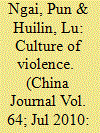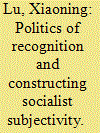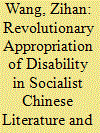|
|
|
Sort Order |
|
|
|
Items / Page
|
|
|
|
|
|
|
| Srl | Item |
| 1 |
ID:
172994


|
|
|
|
|
| Summary/Abstract |
This article argues that the advent of the technological system of CinemaScope in socialist China should be understood as a historical product of the specific material, cultural, and political conditions and configuration of the Cold War. On the one hand, it is the cultural network of the communist bloc that enabled China to obtain this new technology of media infrastructure. On the other hand, the social discourse of CinemaScope embodies the Manichaean Cold War narrative that worked to justify the political-ideological supremacy of communism by articulating a technological modernisation superior to the capitalist model. What is more, CinemaScope also bespeaks the logistics of perception that effectively turns people’s perceptual experience into a political battlefield of the Cold War.
|
|
|
|
|
|
|
|
|
|
|
|
|
|
|
|
| 2 |
ID:
151626


|
|
|
|
|
| Summary/Abstract |
This special issue brings together historians with expertise on China and Western Europe who have the explicit intent of bridging the existing gap between two parallel strands of scholarship, that is, Europe in the Cold War and the history of Socialist China, and combining the different perspectives and approaches of international, diplomatic, business, and cultural historiographies. The contributors’ lively interaction and close collaboration has been the key to the conceptual development of a broader view of the relations between West European countries and Socialist China in the early decades of the Cold War, as well as of China's policy towards the capitalist world before the Reform and Opening era.
|
|
|
|
|
|
|
|
|
|
|
|
|
|
|
|
| 3 |
ID:
101270


|
|
|
|
|
| Publication |
2010.
|
| Summary/Abstract |
This article is a study of socialist feminist cultural practices in the early PRC. It investigates stories behind the scenes and treats the All-China Women's Federation's official journal Women of China as a site of feminist contention to reveal gender conflicts within the Party, diverse visions of socialist transformation, and state feminist strategies in the pursuit of women's liberation. A close examination of discrepancies between the covers and contents of the magazine explicates multiple meanings in establishing a socialist feminist visual culture that attempted to disrupt gender and class hierarchies. Special attention to state feminists' identification with and divergence from the Party's agenda illuminates a unique historical process in which a gendered democracy was enacted in the creation of a feminist cultural front when the Party was consolidating its centralizing power. The article demonstrates a prominent "gender line" in the socialist state that has been neglected in much of the scholarship on the Mao era.
|
|
|
|
|
|
|
|
|
|
|
|
|
|
|
|
| 4 |
ID:
097452


|
|
|
| 5 |
ID:
151627


|
|
|
|
|
| Summary/Abstract |
This article aims to deepen scholarly understanding of the special political and economic connection between Britain and Socialist China during the 1950s and the 1960s. After 1949, the British government had substantive reasons to preserve a link with Beijing, despite the unfolding of the Cold War. First, British assets in China were numerous. Second, the Crown colony of Hong Kong was an indispensable strategic enclave, although militarily indefensible. Third, the Foreign Office considered that Asia should represent an exception to unquestioned British loyalty to the Atlantic alliance, since the United Kingdom needed to prove that it was able to represent and preserve Commonwealth interests in the area. The article will point out that the United Kingdom maintained a privileged role as the main trading partner of the People's Republic of China (PRC) outside the Socialist bloc, thanks to the financial and commercial role played by Hong Kong. This is proved through an analysis of the fate of British financial institutions in China, which represented a favourable exception in the bleak scenario of the PRC nationalization process, as well as of the industrial development of the British colony, which was based on importing food and labour from the mainland, while serving as a financial hub in support of the PRC economy.
|
|
|
|
|
|
|
|
|
|
|
|
|
|
|
|
| 6 |
ID:
128279


|
|
|
|
|
| Publication |
2014.
|
| Summary/Abstract |
Adopting an historical approach, this essay reexamines the national minority films produced between 1949 and 1966 in socialist China with a focus on its role in the Chinese Communist Party's political project of building an ideal socialist citizenry. Shifting the critical anchoring of the national minority film from questions of representation to those of performance and spectatorship, it points out that cross-ethnic performance embedded within film narrative and discerned by historically situated audiences simultaneously constructs and deconstructs ethnicity, thus encouraging a transformative recognition across the ethnic boundary. Ultimately the national minority film models fraternity of citizenship essential to creating socialist subjectivity.
|
|
|
|
|
|
|
|
|
|
|
|
|
|
|
|
| 7 |
ID:
181899


|
|
|
|
|
| Summary/Abstract |
Literature and film in socialist China represented disabled people primarily in two ways: either as courageously contributing to socialist development in spite of physical impairments, or as recovering miraculously due to the medical practices supported by the Chinese Communist Party (CCP). This article seeks to provide a more nuanced understanding of these two narrative paradigms. In the first case, it examines a mutually constitutive structure of love and disability, and then demonstrates how writers maintained a certain agency under socialist censorship by deviating from this structure. In addition, this article traces the formation of miraculous recovery stories and argues that this process was a complex interaction among disability, Soviet or Chinese medical practices, Sino-Soviet relations, and the Mao cult. I will further explore why the second paradigm became more influential than the first one during the Cultural Revolution.
|
|
|
|
|
|
|
|
|
|
|
|
|
|
|
|
| 8 |
ID:
130439


|
|
|
|
|
| Publication |
2014.
|
| Summary/Abstract |
In the past two decades, the number of grass-roots NGOs in China has grown dramatically, yet most scholarship on Chinese civil society has had little to say about the resources on which they rely for survival. This article presents the first large-scale study of these groups and their resources. We compare 263 NGOs across issue areas (including HIV, education, the environment and labor rights) and regions (Beijing, Guangdong and Yunnan). We find that these groups are tapping into high levels of human resources-volunteers, boards of directors and informal government ties-even without official government approval for their activities. We also detail their sources of funding, revealing a diverse support system with clear regional and issue-based biases. Taken together, our findings form a baseline for understanding China's grass-roots NGOs and point out new research questions that have yet to be addressed in the civil society literature.
|
|
|
|
|
|
|
|
|
|
|
|
|
|
|
|
|
|
|
|
|